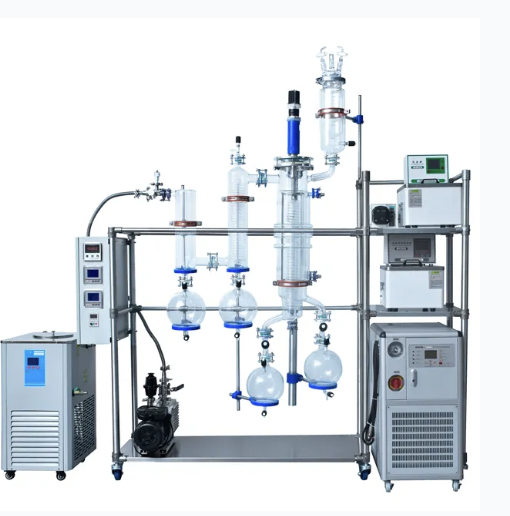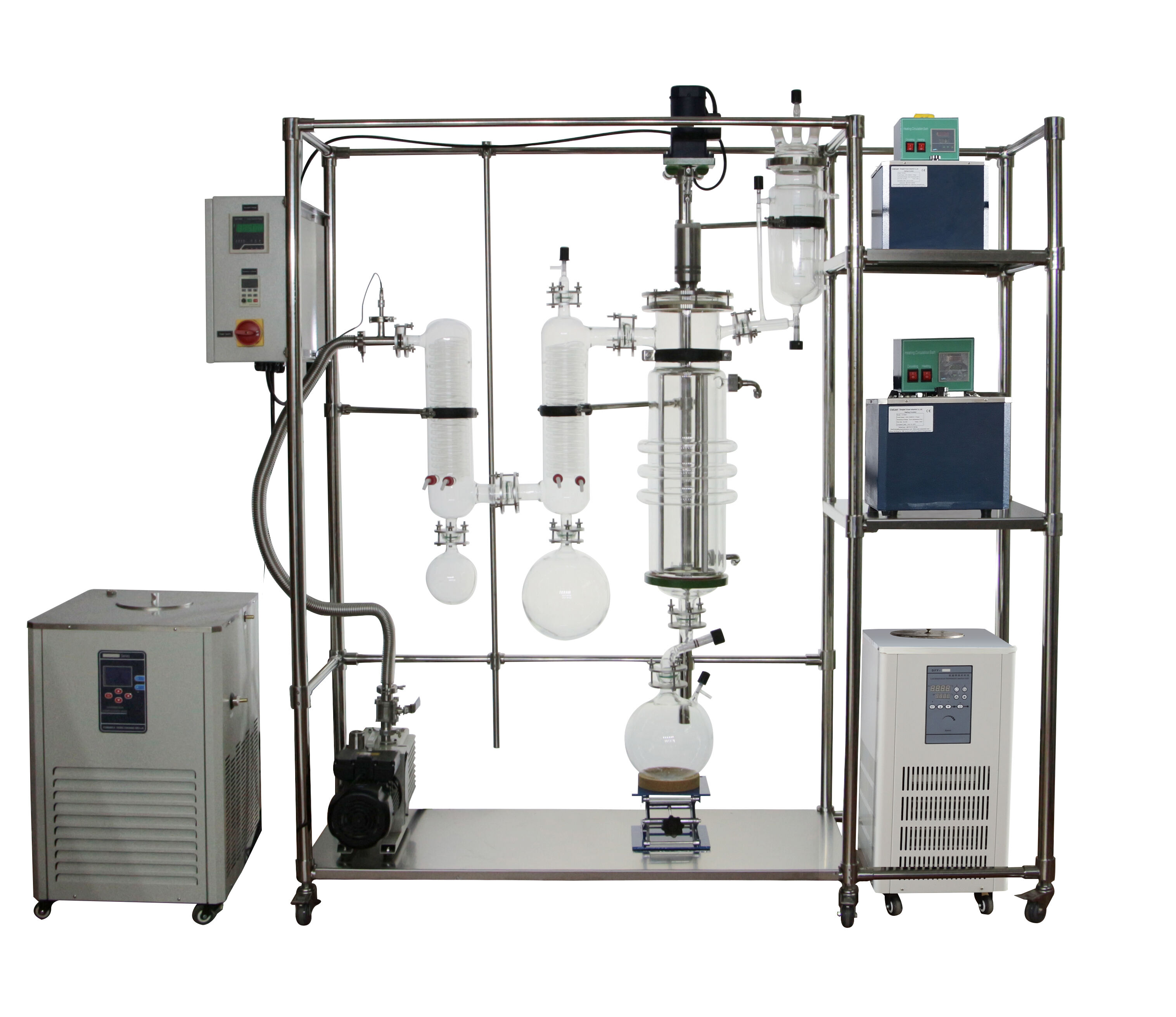Превъзходна химическа устойчивост на стъклени системи
Защо стъклото надхвърля металните алтернативи
Системите за молекулярна дистилация от стъкло са били предпочитани през десетилетия, и химията на производството на материалите му е развивала значително оттогава, далеч надхвърляйки устойчивостта на металите. Непористото стъкло - началото на предимствата на стъкленият материал е нереактивната повърхност на продуктите от стъкло, която не се корозира, както правят металните продукти при сблъсък с агресивни химикали. Изследванията многократно са доказали, че стъклото може успешно да издържа агресивни химикали и тежки условия за продължително време, без да компрометира своите конструктивни свойства, което го прави достоверен избор за най-изпълнителните ви приложения. И в противоположност на металите, стъклото не разпръсква опасни вещества в раствори или течности, което е критично предимство за чувствителни индустрии като химическо производство или фармацевтика, където чистотата е ключова загриженост. Тези реални данни, както и данните представени в следващия пример 4, показват, че металните системи могат да показват знаци на deteroriation, когато са изложени на екстремни pH и силни реагенти, докато стъклени системи, такива като в MD, са способни да издържат тези екстремни pH и мощни реагенти, подчертавайки нейната способност да работи и да бъде надеждна.
Приложения в корозивни среди
Стъклени системи доказват изключително ценни в области, където има много корозивни агенти. Те са особено ценни при лабораторно, химическо и управление на отпадъци, подложени на действие на корозивни вещества. Един пример за фармацевтичната индустрия е пренасянето и съхраняването на корозивни реактиви в стъклени системи, което значително намалява риска от метални съдове. Вече има добре задокументирани случаи за НАИВИСШИЯ ниво на надеждност, който стъклото има в тези условия (в някои сектори то вече се използва като интегрален компонент в критичните системи за безопасност!). Стъклени системи позволяват на индустриите да спазват строгите си изисквания за безопасност, но същевременно да остават продуктивни, което е основен елемент при химическия процес и управлението.
Високочисти способности за разделение
Инертна природа на стъклени материалите
Пасивната характеристика на стъклените материали е значително предимство при разделение с висока чистота. Стъклото не е реактивно, което означава, че извадените съставки са в техния природен вид и без загадници. Тази нереактивна природа предотвратява нежелателните химични реакции с обработваните вещества и гарантира по-добър край продукт. Изследванията показват, че системата от стъкло, особено молекулярните дистилационни системи, дава възможност да се работи при процесни условия, но с изключване на риска от нежелателни химични реакции, които биха загадили пробата по време на изпълнение. Когато се поддържа такъв висок ниво на екологична нейтралност, стъклото може да се счита за незаменим ресурс в среди, където трябва да се изпълняват най-високите изисквания за чистота.
Изключване на метални загадения
Изборът на стъклени системи за разделение безопасно eliminira безпокойството за метална контаминация, често свързана с метални системи. Доказано е, че присъствието на метални импурити може да modificirat по незначителен начин свойствата на крайния органичен продукт, пораждайки досега неописани характеристики. Чрез използването на стъкло, този вид риск е значително намален и разделените вещества няма да бъдат компрометирани. Применението на стъклена молекулярна дистилационна система може да се илюстрира като средство за постигане на по-висока чистота, главните причини за импуритите и не участват в продукта не са контаминатирани от метални импурити. Всичко това прави стъклото по-добър вариант, с добавеното предимство, че не е толкова чисто както в други индустрии.
Реално време Визуално наблюдение на процеса
Прозрачни операционни предимства
Прозрачността на стъклата има голяма полза за визуализацията на процесите по време на дестилация. Процесът на разделяне може да се наблюдава директно от операторите, което позволява по-добро наблюдение и по-бързо финото регулиране. Такава прозрачност елиминира типични грешки при операциите и по този начин създава по-ефективна среда, където поддръжката постоянно се извършва при оптимални условия. Статистически данни показват, че наблюдението на химичните процеси с оглед намалява инцидентите. Наблюдението в реално време позволява на операторите да реагират на проблемите веднага щом възникнат, което подобрява безопасността на дестилацията и гарантира нейната надеждност.
Оптимизация на параметрите чрез наблюдение
Системите от стъкло осигуряват директен визуален контакт сред вътрешните операции и се използват в техниката за оптимизиране на параметрите при дестилацията. Експерименталните резултати показват, че такъв процес на оптимизиране води до по-добри резултати както по отношение на чистота, така и общо по отношение на чистотата на различните материали. Чрез позволяването на визуално проучване на това, което се случва вътре в много сложни стъклени системи за молекулярна дестилация, техничарите могат да вземат обосновани решения, базирани на данните - което помага за подпомагане на иновациите и подобряване на продуктивността. Техничарите могат бързо да променят променливите, когато наблюдават как протичат процесите в реално време, в същото количество време, през което се провеждат процесите на молекулярно разделение, за да се получи най-добрата ефикасност на процеса и най-високата чистота на продукта.
Преванция на замърсяването и гаранция за качеството
Намалени механизми за замърсяване
Една от предимствата на стъклени системи при извършване на Молекулярна Дистилация е тяхната характеристика да не се заболяват. И докато стъклото прави по-малко привлекателна повърхност за прилигане на вещества в сравнение с метал, то ще бъде и по-лесно за чистене. Според изследванията, заболяването може да има голямо влияние върху ефективността на процеса, причинявайки спирания за чистене и поддръжка. Този риск се минимизира благодарение на неприлипващата повърхност на стъклото с ясни крайни продукти. Тази характеристика е особено значима в фармацевтичните приложения, където абсолютната чистота на материалите е жизненоважна. Въздействието върху образуването на заболяване допринася, за да се запази качеството на обработените вещества, което води до по-добър контрол на замърсяването.
Съответствие от партия към партия
Поддържането на еднородност от един батов към следващия е критически фактор в процесите на дестилация, за да се гарантира качеството на продукта. Стъклени системи осигуряват подобрена хомогеност при обработката на материалите, което позволява последователно батово изпълнение. Повечето производители казват, че предметите, които се обработват през стъклени системи, имат по-състоятелно качество и по-малко вариации. Това е потвърдено от индустрийни примери, които показват, че стъклените решения са надежден начин да се гарантира качество през голям брой производствени цикли. Защото стъклото има еднородни термични и химични характеристики, обработките се поддържат в стабилно състояние, а всеки бат може да бъде обработен с не повече от малка вариация между батовете. Следователно, използването на стъкло като система за молекулярна дестилация не само помага да се поддържа последователност, но създава и силна подход за контрол на качеството при производството.

Оптимизирано обслужване и издръжливост
Предимства на корозионната устойчивост
Съпротивността на корозия също е една от големите предимства на стъклени системи; поради това поддръжката и ремонта не са толкова често в сравнение с други системи. В противопоставка на металните варианти, които могат да се кородират/да се разgradят с времето, стъклото е по-малко вероятно да има нужда от замяна и поддържа продължителността на съдовете, което води до най-нисък costa за използване. Повече от това, жизненият цикъл на стъклените решения води до намалено спираne на производствените среди, така че те представляват по-продуктивен вариант за компании. Според данни от журнала за поддръжка, стъклените системи са по-съпротивни към строгите операционни условия и не трябва да бъдат заменяни толкова често, което спестява ресурси и cost за поддръжка.
Ефективност при чистене и спестяване на средства
С оптимална стъклена повърхност, ефективността на чистенето се увеличава значително, което подобрява продуктивността и чистливостта в вашата фабрика. Ефикасните процеси на чистене, обусловени от непорозния състав на стъклото, водят до спестяване на време и пари. Изследвания показват, че тези процеси не само спестяват време за поддръжка, но могат също да намалят материалните разходи и износ. Това, че се изисква по-малко усилия и време за поддръжка, позволява на компании да насочат вниманието си обратно към основните дейности, което подобрява продуктивността и производството. Тази устойчивост е незаменима - аспетизациите могат да продължават без дългите и чести прекъсвания, причинени от трудоемкото чистене.
ЧЗВ
Защо стъклото е по-химически устойчиво от металните системи?
Стъклото е нереактивно и не кородира при контакт с агресивни химикали, в противно на метали, което го прави по-химически устойчиво.
Какво прави стъклените системи подходящи за корозивни среди?
Стъклени системи са високостойки към корозивни вещества и не изсипват шкодливи вещества, което ги прави подходящи за използване в среди с висока експозиция на корозивни агенти.
Как стъклото гарантира разделение с висока чистота?
Инертната природа на стъклото предотвратява каквито и да е неблагоприятни реакции по време на процесите на разделение, гарантирайки чистотата на извлеченияте съставки.
Как прозрачното стъкло подобрява наблюдението на процеса?
Прозрачното стъкло позволява реално-времево визуално наблюдение, което улеснява по-добър контрол и бързи корекции по време на процесите, така че да се подобри безопасността и ефективността.
Какви предимства предлагат стъклени системи относно поддръжката?
Стъклени системи са устойчиви към корозия и замърсяване, което намалява нуждата от поддръжка, съхранявайки същевременно последователното качество на продукта и операционната ефективност.

